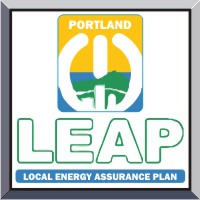 “Your Car Matters” tries to give you useful and entertaining information, but we don’t always succeed. Last month we had an article in our “Popcorn Shorts” section about the LEAP (Local Energy Assurance Plan), a Portland plan for energy security in the event of a major disaster in the city. Our lead for the story focused on one small and quirky part of the plan but didn’t give you an accurate idea of what the overall plan was about. Our reporter was appropriately asked to revise and clarify the information about the Portland LEAP. Sometimes government works well, and LEAP is a prime example of people quietly making things better for when we need it most. This month, we decided to take a deeper and more accurate look at this important preparation for the future…
“Your Car Matters” tries to give you useful and entertaining information, but we don’t always succeed. Last month we had an article in our “Popcorn Shorts” section about the LEAP (Local Energy Assurance Plan), a Portland plan for energy security in the event of a major disaster in the city. Our lead for the story focused on one small and quirky part of the plan but didn’t give you an accurate idea of what the overall plan was about. Our reporter was appropriately asked to revise and clarify the information about the Portland LEAP. Sometimes government works well, and LEAP is a prime example of people quietly making things better for when we need it most. This month, we decided to take a deeper and more accurate look at this important preparation for the future…
Energy, be it electricity, petroleum, or natural gas, is fundamentally important to making our city run. Without energy, most of the things we take for granted become almost impossible. In the event of a disaster like an earthquake or civil unrest, the flow of energy can be almost completely cut off, and these are exactly the situations when we need it most. To strengthen our community before, during, and after an energy disruption or emergency, the Portland Office of Emergency Management (POEM) is taking the lead in preparing a community-wide energy emergency plan; this plan is the Portland Local Energy Assurance Plan (LEAP).
Disruptions to our energy sources can occur at a small scale or a large scale. Most people have had a local power outage in their neighborhood, and know the impact of that situation. Large-scale disasters would likely result in extended power outages and a lack of petroleum. The Portland LEAP clarifies roles, responsibilities and response actions for emergency response organizations, energy providers and energy distributors during an energy disruption or emergency of any kind.
As described by the Portland LEAP webpage, “Energy Assurance” is confidence that energy will be available when needed. To better prepare for an energy emergency, the community, energy providers and distributors, and emergency response organizations must be involved in emergency planning efforts. To facilitate that involvement, the Portland LEAP will engage people and link existing information into an operational energy assurance plan. The plan will be accessible to all, and function as a tool that can be updated as new information is obtained.
Emergency management is not just about response: it is also about sharing the responsibility for preparing for an emergency. The more people who are involved with the creation of the LEAP, the more it will reflect the needs and priorities of the city. The Portland LEAP will be developed through a series of committee meetings, engaging a wide spectrum of community members. The committees include:
The Steering Committee members will provide expertise in energy, environmental protection, sustainability, regulatory compliance, businesses and community livability. They will advocate for the Portland Local Energy Assurance Plan (LEAP) and provide guidance. They will help create and foster relationships between committee members, City staff, citizens, response agencies, local energy providers and others. This committee includes representatives from the City of Portland, energy providers and distributors, two universities, and a State of Oregon agency.
The Neighborhoods and Small Businesses Committee provides perspective on neighborhood well-being, community engagement and livability, and small businesses. This committee includes a cross section of local small businesses, non-profits, schools, agencies, and Portland neighborhood associations representing local residents.
Provides perspective on environmental, economic, and alternative energy matters. This committee includes representatives from the City of Portland, energy providers, health organizations, environmental organizations and financial institutions.
This committee includes a large group of industry, response agency (City of Portland and other agencies), health, telecommunications, and utility organizations.
All this just gives you a taste of the importance, complexity, and scope of Portland’s LEAP. There’s several ways you can go deeper. LEAP has a Frequently Asked Questions sheet to answer more detailed questions, and you can sign up to receive emails and other notifications about Portland LEAP by contacting Project Assistant Penny Bowman at 503-823-9799 or penny.bowman@portlandoregon.gov. If you want to get involved further, then Project Manager Tricia Sears can help. She can be reached by phone at 503-823-2360 and email at tricia.sears@portlandoregon.gov.










